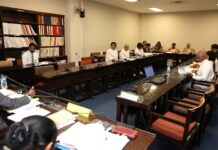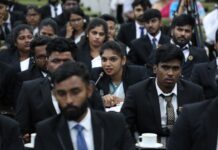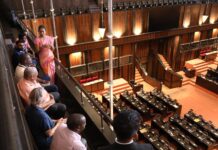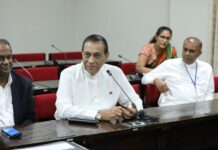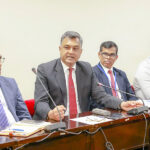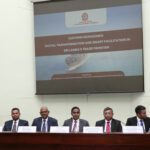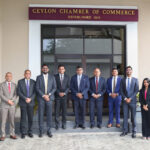A draft constitutional amendment proposals have been handed over to Hon.Speaker by Independent MPs Group on 22nd April 2022.
This Act may be cited as the Twenty Second Amendment to the Constitution.
There shall be a Constitutional Council (in this Chapter referred to as the “Council”) which shall consist of the following members: –
(a) the Prime Minister;
(b) the Speaker;
(c) the Leader of the Opposition in Parliament;
(d) one Member of Parliament appointed by the President;
(e) (i) two Members of Parliament nominated by both the Prime Minister and the Leader of the Opposition” ,
(ii) a professional nominated by Sri Lanka Organization of Professional Association,
(iii) a person nominated by Sri Lanka Chamber of Commerce,
(iv) a professor of a State University nominated by the University Grant Commission,
appointed by the President.
(f) one Member of Parliament nominated by agreement of the majority of the Members of Parliament belonging to political parties or independent groups, other than the respective political parties or independent groups to which the Prime Minister and the Leader of the Opposition belong, and appointed by the President.
(g) if there is no consensual agreement among Vice Chancellors of State Universities regarding a professor to be nominated in terms of paragraph (e )(iv) above, the Chairman of the University Grant Commission shall nominate a professor by the majority vote of Vice Chancellors of State Universities.
(2) The Speaker shall be the Chairman of the Council.
(3) It shall be the duty of the Speaker to ensure that nominations for appointments under sub-paragraph (e) or sub-paragraph (f) of paragraph (1) are made, whenever an occasion for such nominations arises.
(4) In nominating the five persons referred to in sub-paragraph (e) of paragraph (1), the Prime Minister and the Leader of the Opposition shall consult the leaders of political parties and independent groups represented in Parliament so as to ensure that the Constitutional Council reflects the pluralistic character of Sri Lankan society, including professional and social diversity.
(5) The persons who are not Members of Parliament to be appointed under subparagraph (e) of paragraph (1) shall be persons of eminence and integrity who have distinguished themselves in public or professional life and who are not members of any political party whose nomination shall be approved by Parliament.
(6) The President shall, within fourteen days of the receipt of a written communication specifying the nominations made under subparagraphs (e) and (f) of paragraph (1), make the necessary appointments. In the event of the President failing to make the necessary appointments within such period of fourteen days, the persons nominated shall be deemed to have been appointed as members of the Council, with effect from the date of expiry of such period.
(7)(a) On the dissolution of Parliament, notwithstanding the provisions of paragraph (2) of Article 64, the Speaker shall continue to hold office as a member of the Council, until a Member of Parliament is elected to be the Speaker under paragraph (1) of the aforesaid Article;
(b) Notwithstanding the dissolution of Parliament, the Prime Minister, the Leader of the Opposition and the Members of Parliament who are members of the Constitutional Council, shall continue to hold office as Members of such Council, until such time after a General Election following such dissolution, a Member of Parliament is appointed as the Prime Minister or recognized as the Leader of the Opposition or such number of Members of Parliament are appointed as Members of the Constitutional Council under sub-paragraphs (d), (e) and (f) of paragraph (1), as the case may be.
(8) Every member of the Council appointed under sub-paragraphs (d), (e) and (f) of paragraph (1), shall hold office for a period of three years from the date of appointment unless the member earlier resigns his office by writing addressed to the President, or, is removed from office by the President on both the Prime Minister and the Leader of the Opposition forming an opinion that such member is physically or mentally incapacitated and is unable to function further in office or is convicted by a court of law for any offence involving moral turpitude or if a resolution for the imposition of civic disability upon him has been passed in terms of Article 81 of the Constitution or is deemed to have vacated his office under paragraph (7) of Article 41E.
(9) In the event of there being a vacancy among the members appointed under subparagraphs (d), (e) or (f)) of paragraph (1), the President shall, within fourteen days of the occurrence of such vacancy and having regard to the provisions of the aforementioned subparagraphs, appoint another person to succeed such member. Any person so appointed, shall hold office during the unexpired part of the period of office of the member whom he succeeds.
(10) A member appointed under subparagraphs (d), (e) or (f) of paragraph (1), shall not be eligible for re-appointment.
41B. (1) No person shall be appointed by the President as the Chairman or a member of any of the Commissions specified in the Schedule to this Article, except on a recommendation of the Council.(11) The appointments made by the President under sub-paragraphs (d), (e) and (f) of paragraph (1), shall be communicated to the Speaker.
(2) The provisions of paragraph (1) of this Article shall apply in respect of any person appointed to act as the Chairman or as a member of any such Commission.
(3) It shall be the duty of the Council to recommend to the President fit and proper persons for appointment as Chairmen or members of the Commissions specified in the Schedule to this Article, whenever the occasion for such appointments arises, and such recommendations shall endeavour to ensure that such recommendations reflect the pluralistic character of Sri Lankan society, including gender. In the case of the Chairmen of such Commissions, the Council shall recommend three members for appointment, and the President shall appoint one of the members recommended as Chairman.
(4) The President shall appoint the Chairman and the members of the Commissions specified in the Schedule to this Article, within fourteen days of receiving the recommendations of the Council for such appointments. In the event of the President failing to make the necessary appointments within such period of fourteen days–
(a) the persons recommended under paragraph (3), to be appointed as members of a Commission, shall be deemed to have been appointed as the members of the Commissions; and
(b) the person whose name appears first in the list of names recommended under paragraph (3), to be appointed as the Chairman of a Commission, shall be deemed to have been appointed the Chairman of the respective Commission,
with effect from the date of expiry of such period.
(5) No person appointed under paragraph (1) or a person appointed to act as the Chairman or a member of any such Commission, shall be removed except as provided for in the Constitution or in any written law, and where there is no such provision, such person shall be removed by the President only with the prior approval of the Council.
(6) All the Commissions referred to in the Schedule to this Article, other than the Election Commission, shall be responsible and answerable to Parliament.
The Constitutional amendment has suggested that appointments to the following Commissions be approved by the said Council :
(a) The Election Commission.
(b) The Public Service Commission.
(c) The National Police Commission.
(d) The Audit Service Commission.
(e) The Human Rights Commission of Sri Lanka.
(f) The Commission to Investigate Allegations of Bribery or Corruption.
(g) The Finance Commission.
(h) The Delimitation Commission.
(i) The National Procurement Commission.
Information courtesy: Department of Communication Parliament of Sri Lanka





